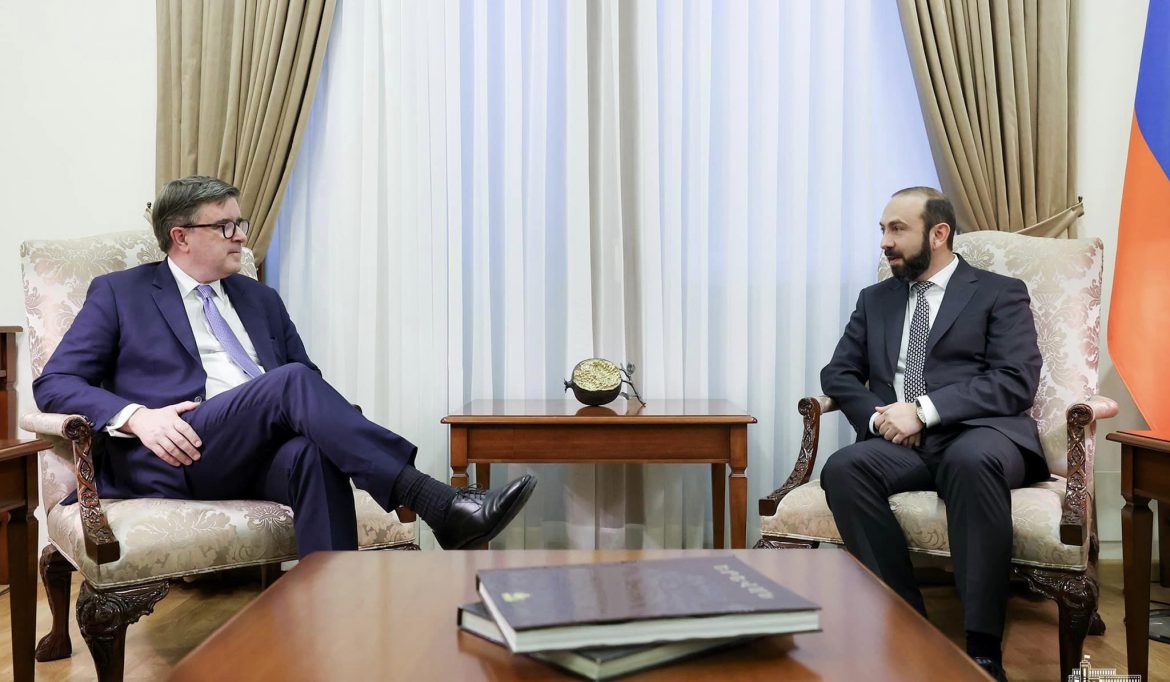A peace treaty between Armenia and Azerbaijan would not only end their prolonged conflict but also diminish Russian influence in the region and establish a new trade route from Central Asia to Turkey, according to a senior U.S. official.
This is why the United States is encouraging the two South Caucasus nations to finalize such an agreement “over the next weeks to months,” U.S. Assistant Secretary of State James O’Brien.
“In our view, there’s a once-in-a-generation, maybe several-generations, opportunity to build a trade route from Central Asia across to the Mediterranean,” said O’Brien. “That can come only if there is peace between Armenia and Azerbaijan. And that would open up not just basic commerce but new industries all across the route. That can happen now. In a few years, it may no longer matter as much … So now is the moment to do that.”
“I also think it’s a great moment because we are seeing the countries all along that route see that they want less Russian influence,” he said, speaking after U.S.-Armenian talks held in Yerevan.
The trade route, O’Brien continued, would “supplement” existing transport links running from Central Asia to Georgia’s Black Sea coast through Azerbaijan. “These two routes together would provide Central Asian countries with their first access to global markets that does not depend on Russia or China,” he said.
The signing of the peace treaty is hampered, among other things, by Azerbaijan’s continued demands for an extraterritorial corridor that would connect it to its Nakhichevan exclave through a key Armenian region. Turkish President Recep Tayyip Erdogan has said the so-called “Zangezur corridor” sought by Baku is important also because it would link Turkey to the ex-Soviet Turkic republics of Central Asia.
Asked whether Washington backs Baku’s demands, O’Brien said: “Well, we usually talk about it as a trade route. It’s very much like the Armenian idea of the ‘Crossroads for Peace’ and some kind of a route.”
The U.S. diplomat expressed hope that Armenians understand the additional “dividend” of a peace deal with Azerbaijan.
“Russia is not winning in Ukraine, and so it’s not coming back to the Caucasus in the way that it was for so long,” he said. “And now it’s a time, for particularly the citizens of Armenia, to say again, ‘We have decided we want to move forward, we don’t want to move back.’ And now there’s an opportunity to move forward because of Russia being bogged down in Ukraine.”
The Armenian government has been reorienting its foreign and security policy towards the West, sparking unprecedented tensions with Moscow. Russia has accused Armenia of systematically destroying Russian-Armenian relations at the behest of the United States and the European Union. Russian Deputy Foreign Minister Mikhail Galuzin insisted last week that the Western powers are offering no “viable alternatives” to Armenia’s alliance with Russia.
Moscow has also been very critical of Western efforts to facilitate the resolution of the Armenian-Azerbaijani conflict. Russian officials regularly claim that their main goal is to drive Russia out of the region.
Prime Minister Nikol Pashinyan’s government has also faced strong domestic criticism of his policy towards Azerbaijan. Pashinyan’s recent decision to cede several border areas to Baku as part of a controversial border delimitation deal sparked antigovernment street protests in Yerevan.
O’Brien hailed the border deal, calling it “a very constructive basis for next steps.”




